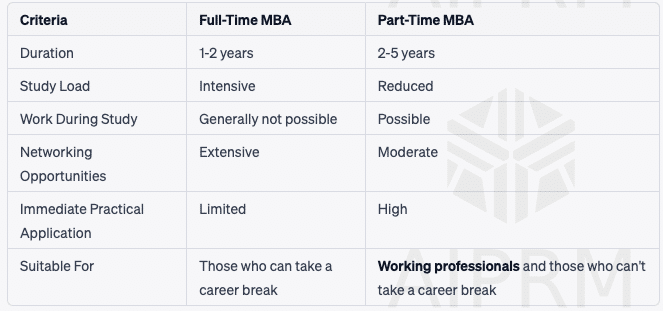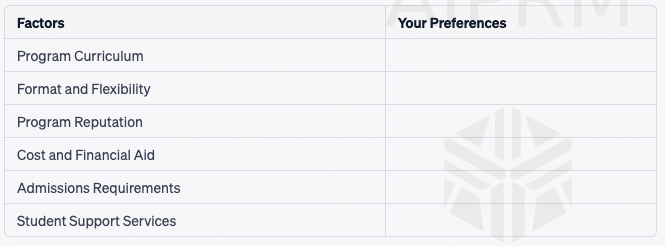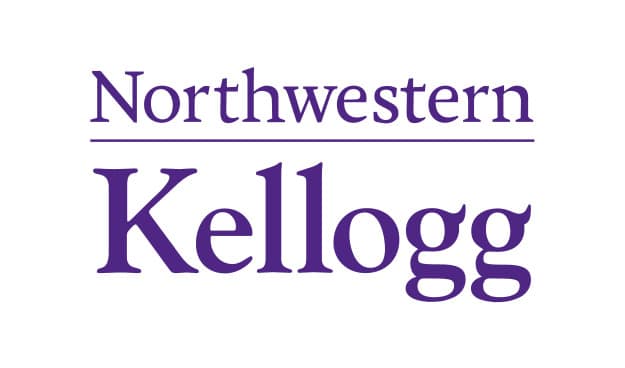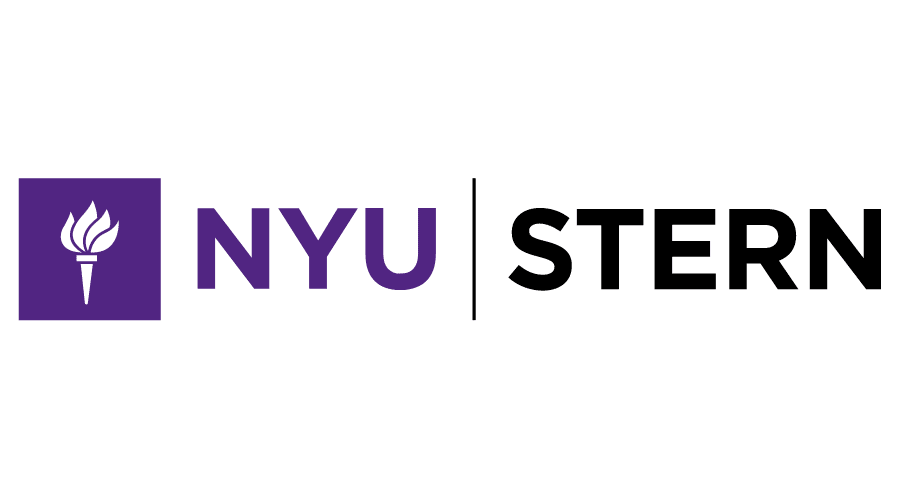
Have you ever felt like you’re walking a tightrope? Balancing the desire to boost your career with the need to expand your knowledge?
Trust me; you’re not the only one.
Many go-getters find themselves in this predicament. But what if there’s a bridge that connects these two sides? Welcome to the universe of the best part-time MBA programs.

Part-time MBA programs are, without a doubt, a boon for driven professionals. A report by the Association to Advance Collegiate Schools of Business (AACSB) reveals that more than 40% of MBA aspirants enroll in part-time programs, signaling a clear trend.
These programs are tailor-made to mesh with the bustling lives of working professionals, striking the perfect balance between flexibility and high-quality education. They let you hold onto your current job while setting the stage for exciting career growth.
This comprehensive guide will shine a light on part-time MBA programs. We’ll delve into what makes these programs tick, the advantages they bring to the table, and highlight the cream of the crop in part-time MBA programs.
So, are you ready to embark on this journey? Because your career transformation begins right here!
Understanding Part-Time MBA Programs
Before we dive into the list of the best part-time MBA programs, let’s take a moment to understand what a part-time MBA program is and how it differs from its full-time counterpart. This knowledge will provide a firm foundation for your decision-making process.
What is a Part-Time MBA Program?
A part-time MBA program is a flexible version of the traditional full-time MBA program. It’s designed to cater to working professionals and busy professionals who wish to advance their education without putting their careers on hold. The program usually spans longer than a full-time program due to its part-time nature, typically ranging from two to five years.
The curriculum of a part-time program mirrors that of a full-time program, covering core business concepts such as finance, marketing, operations, and leadership. Some programs also offer specializations in areas like international business or quantitative finance, allowing students to tailor their education to their career goals.
In a part-time MBA program, students attend classes during the evenings or weekends, making it a perfect fit for those juggling multiple responsibilities. In addition, with technological advancements, many business schools also offer online MBA programs that deliver content through digital platforms, further increasing the flexibility and accessibility of the program.
How Does a Part-Time MBA Differ from Full-Time?
While full-time and part-time MBA programs aim to equip students with advanced business knowledge and leadership skills, their structure and student experience vary significantly.
A full-time MBA program usually takes one to two years to complete and requires students to take a break from their careers. On the other hand, a part-time MBA program allows working professionals to continue their jobs while studying, extending the program’s duration due to the reduced study load.
The interaction opportunities and networking experiences also differ. Full-time MBA students typically have more opportunities for internships, networking events, and on-campus activities. However, part-time MBA students can apply their learnings directly to their current jobs, offering immediate practical application and often enhancing their performance at work.

Note: table in GPT text doesn’t come to Surfer as a table, but it might in WordPress
We hope this section has provided a clear understanding of part-time MBA programs and how they contrast with full-time programs. Armed with this knowledge, you’re now better equipped to decide which program is best for your career aspirations and lifestyle.
Next, we will explore the many benefits of part-time MBA programs.
Choosing the Best Part-Time MBA Program
Selecting the right part-time MBA program from a sea of options is an uphill battle. But fear not – by focusing on a few key factors, you can find a program that aligns with your career aspirations, learning style, and lifestyle. Let’s break down these factors:
Key Factors to Consider
- Program Curriculum: Every MBA program offers a unique blend of core and elective courses. Ensure the curriculum aligns with your career goals. For example, if you’re interested in a specific area, such as international business or quantitative finance, look for programs that offer relevant specializations or elective courses.
- Format and Flexibility: Evaluate if the program’s structure suits your lifestyle. Would an evening MBA program, a weekend program, or an online MBA program work best for you? The time MBA that fits into your schedule will allow you to manage work, studies, and personal commitments effectively.
- Program Reputation: A business school’s reputation can significantly impact your future career prospects. Look for business schools with strong alumni networks, high post-graduation employment rates, and good rankings in publications like the News and World Report.
- Cost and Financial Aid: An MBA is a substantial investment. Consider the program’s total cost, including tuition, books, and other expenses. Also, explore the availability of scholarships and financial aid.
- Admissions Requirements: Understand the program’s admissions requirements, including the need for GMAT or GRE scores, work experience, and an average undergraduate GPA. The eligibility criteria can help you gauge the competitiveness of the program and your chances of admission.
- Student Support Services: Look for programs that offer full support services, including career counseling, academic support, and networking opportunities. These services can enhance your MBA experience and career prospects.
The Decision-Making Matrix

Use this matrix to jot down your preferences and compare different programs. This structured approach will make the selection process more manageable and effective.
Accreditation: A Mark of Quality
One crucial factor that prospective students often overlook is accreditation. Accreditation is a quality assurance process that business schools undergo to confirm that their programs meet the high standards set by an external body.
In MBA programs, the Association to Advance Collegiate Schools of Business (AACSB) grants the gold standard of accreditation. Other reputable accrediting bodies include the Accreditation Council for Business Schools and Programs (ACBSP) and the International Accreditation Council for Business Education (IACBE).
Choosing an accredited program ensures you receive a high-quality education that employers worldwide recognize. Thus, while perusing the best part-time MBA programs, be sure to check if a recognized body accredits the business school.
Armed with this knowledge, you’re ready to plunge into the world of part-time MBA programs and find your perfect match. We’re still with you. Up next, we’re spotlighting some of the best part-time MBA programs globally.
Best Part-Time MBA Programs
After understanding what part-time MBA programs are and how to choose the best one, it’s time we turn our attention to the leaders in the field. Let’s dive in!
1. Kellogg School of Management – Northwestern University

Northwestern University’s Kellogg School of Management is a trailblazer in the field of part-time MBA programs. With a blend of rigorous academics and practical experience, it offers an immersive, transformative learning experience that prepares leaders for the dynamic business world. Specializations range from finance and marketing to entrepreneurship and international business.
Why choose Kellogg? The school’s emphasis on collaboration, leadership skills, and innovative thinking sets it apart. Plus, its strong alumni network presents abundant opportunities for networking and career advancement.
- Acceptance rate: 21%
- Cost per credit: $7,604
- Average GMAT score: 729
2. Chicago Booth School of Business – University of Chicago

The part-time MBA program at the Chicago Booth School of Business is renowned for its academic quality, its flexible curriculum, and world-class faculty. It offers concentrations in areas like quantitative finance, marketing, and strategic management.
Choosing Chicago Booth is choosing to be part of a rich, diverse learning environment with a deep commitment to free and open inquiry. The school encourages its students to challenge conventions and take risks, fostering an entrepreneurial mindset.
- Acceptance rate: 23%
- Cost per credit: $8,096 (per unit course)
- Average GMAT score: 691
3. Stern School of Business – New York University

NYU Stern School of Business offers a part-time MBA program designed for busy professionals. Stern’s curriculum allows students to specialize in up to three areas from a choice of 20, making it one of the most customizable MBA programs out there.
Why Stern? Its location in the heart of New York City, the epicenter of international business, offers students unparalleled access to companies and industries. Furthermore, its focus on experiential learning prepares students for real-world business challenges.
- Acceptance rate: 27%
- Cost per credit: $2,654
- Average GMAT score: 670
4. Ross School of Business – University of Michigan

The Ross School of Business at the University of Michigan offers a top-ranked part-time MBA program known for its action-based learning approach. Specializations include corporate strategy, entrepreneurship, and finance.
Why Ross? The school’s commitment to action-based learning enables students to apply classroom theory to real-world business scenarios. Its strong emphasis on team-based projects also enhances collaborative skills, preparing students for the interconnected business world.
- Acceptance rate: 12%
- Cost per credit: $4,500
- Average GMAT score: 702
5. Anderson School of Management – University of California, Los Angeles (UCLA)

UCLA Anderson School of Management provides a flexible, customizable part-time MBA program, perfect for working professionals. It allows students to choose from a wide array of specializations, including brand management, real estate, and international business.
Why Anderson? The school emphasizes producing leaders who make a positive impact, fostering a spirit of innovation and entrepreneurship. Its location in Los Angeles also provides a gateway to numerous industries, enhancing networking opportunities.
- Acceptance rate: 12%
- Cost per credit: $805
- Average GMAT score: 706
6. Foster School of Business – University of Washington
The part-time MBA program at the Foster School of Business is known for its collaborative learning environment, rigorous curriculum, and strong ties with the business community. It offers a range of specializations, including entrepreneurship, finance, and marketing.
Choosing Foster means becoming part of a close-knit community that encourages mutual growth. In addition, Foster’s strong connections with Seattle’s thriving tech industry also provide numerous internships and job placement opportunities.
- Acceptance rate: 30%
- Cost per credit: $1,195
- Average GMAT score: 703
7. McDonough School of Business – Georgetown University
Georgetown University’s McDonough School of Business offers a part-time MBA program that stands out for its global perspective, ethical focus, and commitment to service. It provides specializations in areas such as international business, marketing, and real estate.
Why McDonough? Its Jesuit values of ethics and service make it a unique choice for students who want to make a positive impact in the business world. Its location in Washington D.C. also offers close proximity to government, non-profits, and a range of industries.
- Acceptance rate: 77%
- Cost per credit: $2,310
- Average GMAT score: 704
8. Whitman School of Management – Syracuse University
The Whitman School of Management at Syracuse University is one of the advanced collegiate schools offering an online part-time MBA program, providing maximum flexibility for busy professionals. The program has a variety of specializations, including accounting, business administration, analytics, and supply chain management.
Why Whitman? Its emphasis on experiential learning and its unique online learning environment set it apart. Plus, its strong network of successful alums provides excellent networking opportunities.
- Acceptance rate: 46%
- Cost per credit: $1,872
- Average GMAT score: 623
9. Marshall School of Business – University of Southern California
USC Marshall School of Business offers a top-ranked part-time MBA program. Its curriculum is designed to build a broad understanding of business, specializing in entrepreneurship, finance, and marketing.
Why Marshall? The school’s commitment to fostering an entrepreneurial mindset and its strong connections with the Los Angeles business community make it a standout choice. It also has online classes and offers an online MBA program for part-time MBA students who want to earn their online MBA.
- Acceptance rate: 30%
- Cost per credit: $2,197
- Average GMAT score: 707
10. The Knauss – University of San Diego
The Knauss MBA program at the University of San Diego is an esteemed and rigorous business program designed to equip students with the knowledge and skills needed to excel in the competitive business world. With a focus on practical application and a holistic approach to education, the program offers a comprehensive curriculum that covers key areas such as entrepreneurship, finance, and marketing.
Why Knauss? Knauss tudents benefit from a vibrant learning environment, expert faculty, and numerous networking opportunities within San Diego’s thriving business community. It also has a high acceptance rate..
- Acceptance rate: 94%
- Cost per credit: $1,565
- Average GMAT score: 614
11. Kenan-Flagler Business School – University of North Carolina
UNC’s Kenan-Flagler Business School offers a part-time MBA program that stands out for its core business knowledge and leadership development. It offers a variety of specializations, including corporate finance, marketing, and data analytics. This comes in the form of online MBA programs as well.
Why Kenan-Flagler? Its emphasis on leadership development and its collaborative learning environment makes it a great choice for those looking to step up in their careers.
12. Mendoza College of Business – University of Notre Dame
The Mendoza College of Business at the University of Notre Dame offers a unique part-time MBA program emphasizing ethical leadership and advanced business skills. In addition, it offers a range of specializations, including consulting, entrepreneurship, and corporate finance.
Why Mendoza? Its focus on ethical business practices and its strong alumni network make it an attractive choice for future business leaders.
13. Cox School of Business – Southern Methodist University
The part-time MBA program at SMU’s Cox School of Business is known for its small classes and personalized attention. It offers specializations in areas like accounting, finance, and marketing.
Why Cox? Its commitment to shaping business leaders through a combination of rigorous coursework, experiential learning, and a focus on ethics and integrity sets it apart.
14. Scheller College of Business – Georgia Tech
Georgia Tech’s Scheller College of Business offers a part-time MBA program that combines business fundamentals with a focus on technology and innovation. In addition, it offers a range of specializations, including operations management, marketing, and strategy.
Why Scheller? Its unique focus on technology and innovation in business, along with its strong ties to Atlanta’s thriving business community, make it an appealing choice for future leaders in the tech industry.
15. Goizueta Business School – Emory University
Emory’s Goizueta Business School offers a top-notch part-time MBA program focusing on experiential learning and leadership development. In addition, it offers a variety of specializations, including finance, marketing, and strategy consulting.
Why Goizueta? Its commitment to small class sizes for personalized attention and its strong connections to Atlanta’s vibrant business community make it an ideal choice for those looking to propel their careers forward.
16. Leeds School of Business – University of Colorado, Boulder
The Leeds School of Business offers a part-time MBA program that combines business fundamentals with a focus on leadership and entrepreneurship. Specializations include marketing, finance, and strategic management.
Why Leeds? Its commitment to experiential learning and its strong connections to Boulder’s thriving tech and startup community make it a compelling choice for aspiring entrepreneurs.
17. Katz Graduate School of Business – University of Pittsburgh
The Katz School of Business offers a flexible part-time MBA program known for its experiential learning and global perspective. It offers specializations in areas such as finance, marketing, and operations.
Why Katz? Its emphasis on experiential learning, its strong alumni network, and its commitment to diversity and inclusion makes it an attractive choice for aspiring business leaders.
18. Carroll School of Management – Boston College
Boston College’s Carroll School of Management offers a part-time MBA program emphasizing ethical leadership and strategic decision-making. Specializations include finance, marketing, and entrepreneurship.
Why Carroll? Its focus on forming ethical, well-rounded business leaders and its strong ties to Boston’s diverse industries make it a unique choice for future managers and entrepreneurs.
19. Naveen Jindal School of Management – University of Texas, Dallas
The Jindal School of Management offers a highly flexible part-time MBA program designed with working professionals in mind. It provides a range of specializations, including innovation and entrepreneurship, finance, and IT management.
Why Jindal? Its strong emphasis on research, innovation, and a global perspective, along with its strong connections to Dallas’s thriving tech industry, make it an appealing choice for those aiming to lead in the digital economy.
20. W. P. Carey School of Business – Arizona State University
Arizona State’s W. P. Carey School of Business offers a part-time MBA program that combines core business skills with research and innovation. It offers specializations in finance, marketing, and supply chain management.
Why W. P. Carey? Its commitment to producing innovative leaders and its strong connections with Phoenix’s rapidly growing business community make it an ideal choice for those looking to lead in the modern business world.
21. Fisher College of Business – Ohio State University
The Fisher College of Business offers a part-time MBA program that emphasizes leadership development and business strategy. In addition, it provides a range of specializations, including operations management, finance, and marketing.
Why Fisher? Its focus on leadership skills and its strong ties to Columbus’s diverse industries, coupled with the vast resources of Ohio State University, make it a compelling choice for future business leaders.
22. Merage School of Business – University of California, Irvine
UC Irvine’s Merage School of Business offers a part-time MBA program emphasizing strategic innovation and information technology. It offers a variety of specializations, including digital transformation, marketing, and real estate.
Why Merage? Its unique focus on digital transformation and its strong connections to Southern California’s vibrant tech industry makes it an excellent choice for those looking to lead in the digital age.
23. Simon Business School – University of Rochester
The Simon Business School offers a part-time MBA program that combines quantitative analysis with economics-based strategy. Specializations include finance, marketing, and operations management.
Why Simon? Its emphasis on analytical thinking and strong connections with Rochester’s business community make it an appealing choice for those looking to make data-driven career decisions.
24. Smith School of Business – University of Maryland
The Smith School of Business offers a part-time MBA program emphasizing a global perspective and social value creation. It offers a range of specializations, including supply chain management, finance, and marketing.
Why Smith? Its focus on social entrepreneurship and its strong ties to Washington D.C.’s diverse business environment makes it a unique choice for aspiring business leaders.
25. Mays Business School – Texas A&M University
The Mays Business School offers a flexible part-time MBA program emphasizing leadership development and strategic decision-making. It provides a range of specializations, including data analytics, marketing, and finance.
Why Mays? Its focus on leadership and its strong connections to Texas’s diverse industries make it an appealing choice for aspiring leaders.
26. Tippie College of Business – University of Iowa
The Tippie College of Business offers a part-time MBA program that combines business fundamentals with a focus on strategic innovation. Specializations include marketing, finance, and entrepreneurship.
Why Tippie? Its commitment to experiential learning and its strong connections to Iowa’s thriving business community make it a compelling choice for future entrepreneurs.
27. Weatherhead School of Management – Case Western Reserve University
Case Western Reserve’s Weatherhead School of Management offers a part-time MBA program that emphasizes leadership and innovation. In addition, it offers a variety of specializations, including finance, marketing, and healthcare management.
Why Weatherhead? Its unique focus on design thinking in business and its strong ties to Cleveland’s healthcare industry make it an excellent choice for those looking to lead in the healthcare sector.
28. Neeley School of Business – Texas Christian University
TCU’s Neeley School of Business offers a part-time MBA program known for its small class sizes and personalized attention. It offers specializations in areas such as supply chain management, finance, and marketing.
Why Neeley? Its emphasis on experiential learning, its strong alumni network, and its commitment to ethical business practices make it an attractive choice for aspiring business leaders.
29. Owen Graduate School of Management – Vanderbilt University
Vanderbilt’s Owen Graduate School of Management offers a top-notch part-time MBA program focusing on experiential learning and leadership development. In addition, it offers a variety of specializations, including finance, marketing, and strategy consulting.
Why Owen? Its commitment to small class sizes for personalized attention and its strong connections to Nashville’s vibrant business community make it an ideal choice for those looking to propel their careers forward.
30. Lerner College of Business – University of Delaware
The Lerner College of Business at the University of Delaware offers a unique part-time MBA program emphasizing innovation and entrepreneurship. Specializations include finance, strategic leadership, and international business.
Why Lerner? Its emphasis on real-world learning and its strong ties to Delaware’s diverse business community make it an appealing choice for future business leaders.
31. Daniels College of Business – University of Denver
The Daniels College of Business offers a highly flexible part-time MBA program designed with working professionals in mind. It provides a range of specializations, including real estate and the built environment, marketing, and finance.
Why Daniels? Its strong emphasis on ethics, sustainability, and the role of business in society and its strong connections to Denver’s thriving business community make it an appealing choice for those aiming to make a positive impact through business.
32. Gatton College of Business and Economics – University of Kentucky
The Gatton College of Business and Economics offers a part-time MBA program that emphasizes leadership development and strategic decision-making. In addition, it offers a variety of specializations, including project management, marketing, and finance.
Why Gatton? Its focus on leadership skills and its strong ties to Kentucky’s diverse industries, coupled with the resources of the University of Kentucky, make it a compelling choice for future business leaders.
- Acceptance rate: 49%
- Cost per credit: $1,283
- Average GMAT score: 580
33. Smeal College of Business – Pennsylvania State University
Penn State’s Smeal College of Business offers a part-time MBA program that combines business fundamentals with a focus on integrity and ethical decision-making. Specializations include supply chain management, marketing, and finance.
Why Smeal? Its commitment to producing leaders of character and its strong connections to Pennsylvania’s diverse industries make it a compelling choice for those seeking to make a positive impact in business.
34. Fox School of Business – Temple University
Temple University’s Fox School of Business offers a part-time MBA program that emphasizes strategic leadership and international business. In addition, it offers a range of specializations, including marketing, finance, and human resource management.
Why Fox? Its focus on real-world learning and its strong ties to Philadelphia’s vibrant business community make it a unique choice for future managers and entrepreneurs.
35. LeBow College of Business – Drexel University
Drexel’s LeBow College of Business offers a part-time MBA program known for its integrative and experiential approach to business education. It provides a range of specializations, including entrepreneurship, marketing, and finance.
Why LeBow? Its commitment to practical, real-world learning and its strong connections to Philadelphia’s diverse industries make it a compelling choice for future business leaders.
36. Moore School of Business – University of South Carolina
The Moore School of Business offers a part-time MBA program that emphasizes international business and strategic leadership. It offers specializations in areas such as finance, marketing, and human resource management.
Why Moore? Its strong focus on global business issues and its strong ties to South Carolina’s diverse industries make it an excellent choice for those looking to lead in the global business world.
37. Hough Graduate School of Business – University of Florida
The Hough Graduate School of Business offers a part-time MBA program that combines business fundamentals with a focus on innovation and technology. Specializations include marketing, finance, information systems, and operations management.
Why Hough? Its commitment to innovative thinking and its strong connections to Florida’s burgeoning tech industry make it a compelling choice for those looking to lead in the digital age.
38. Belk College of Business – University of North Carolina, Charlotte
UNC Charlotte’s Belk College of Business offers a part-time MBA program known for its flexibility and high-quality teaching. It offers a variety of specializations, including finance, marketing, and management.
Why Belk? Its commitment to flexible, personalized learning and its strong ties to Charlotte’s vibrant business community make it an attractive choice for working professionals.
39. Massey College of Business – Belmont University
Belmont University’s Massey College of Business offers a part-time MBA program that emphasizes leadership and ethical decision-making. In addition, it offers a range of specializations, including healthcare management, finance, and marketing.
Why Massey? Its focus on ethical leadership and its strong connections to Nashville’s diverse industries make it a unique choice for future business leaders.
40. Sobey School of Business – Saint Mary’s University
Saint Mary’s University’s Sobey School of Business offers a part-time MBA program known for its emphasis on responsible leadership and sustainability. It provides a variety of specializations, including finance, marketing, and entrepreneurship.
Why Sobey? Its commitment to sustainable business practices and its strong ties to Halifax’s diverse business community make it an appealing choice for those aiming to positively impact their careers.
41. Orfalea College of Business – California Polytechnic State University
Cal Poly’s Orfalea College of Business offers a part-time MBA program that combines business fundamentals with a focus on innovation and entrepreneurship. Specializations include marketing, finance, and information systems.
Why Orfalea? Its commitment to experiential learning and its strong connections to California’s diverse business community make it a compelling choice for future entrepreneurs.
42. Sprott School of Business – Carleton University
Carleton University’s Sprott School of Business offers a part-time MBA program that emphasizes international business and strategic leadership. Although not really considered one of the advance collegiate schools, it offers a variety of specializations, including finance, marketing, and international business.
Why Sprott? Its strong focus on global business issues and its strong ties to Ottawa’s diverse industries make it an excellent choice for those looking to lead in the international business world.
43. Asper School of Business – University of Manitoba
The Asper School of Business offers a part-time MBA program that combines business fundamentals with a focus on sustainability and innovation. Specializations include leadership and organizations, finance, and marketing.
Why Asper? Its commitment to sustainable business practices and its strong connections to Manitoba’s burgeoning tech industry make it a compelling choice for those looking to lead in the digital age.
44. Goodman School of Business – Brock University
Brock University’s Goodman School of Business offers a part-time MBA program that focuses on experiential learning and high-quality teaching. It offers a variety of specializations, including finance, marketing, and management.
Why Goodman? Its commitment to real-world learning and its strong ties to Ontario’s vibrant business community make it an attractive choice for working professionals.
45. Tobin College of Business – St. John’s University
St. John’s University’s Tobin College of Business offers a part-time MBA program that emphasizes leadership and ethical decision-making. It offers a range of specializations, including risk management and insurance, finance, and marketing.
Why Tobin? Its focus on ethical leadership and its strong connections to New York’s diverse industries make it a unique choice for future business leaders.
46. Wisconsin School of Business at University of Wisconsin—Madison
One of the nation’s premier public university systems, the University of Wisconsin—Madison offers a high-quality, competitive part-time MBA program through the Wisconsin School of Business. They specialize in providing a broad-based, integrated business curriculum with a focus on real-world applications. This program is renowned for its collaborative culture and tight-knit community, making it an excellent choice for individuals seeking to enhance their leadership skills and professional network.
Why Wisconsin School of Business? They have always had a sterling reputation for research and academic quality. Plus, its strategic location in the capital city of Wisconsin gives part-time MBA students ample opportunities for internships, networking, and job placements in a vibrant, diverse business ecosystem.
47. Smith School of Business – University of Maryland
The Smith School of Business offers a part-time MBA program that combines business fundamentals with a focus on innovation and technology. Specializations include operations management, finance, and marketing.
Why Smith? Its commitment to innovative thinking and its strong connections to Maryland’s burgeoning tech industry make it a compelling choice for those looking to lead in the digital age.
48. Coles College of Business – Kennesaw State University
Kennesaw State University’s Coles College of Business offers a part-time MBA program known for its flexibility and high-quality teaching. It offers a variety of specializations, including finance, marketing, and management.
Why Coles? Its commitment to flexible, personalized learning and its strong ties to Georgia’s vibrant business community make it an attractive choice for working professionals.
49. Haskayne School of Business – University of Calgary
The Haskayne School of Business offers a part-time MBA program that emphasizes leadership and ethical decision-making. It offers a range of specializations, including finance, global energy management and sustainable development, and marketing.
Why Haskayne? Its focus on ethical leadership and its strong connections to Calgary’s diverse industries make it a unique choice for future business leaders.
50. Graziadio School of Business – Pepperdine University
Pepperdine University’s Graziadio School of Business offers a part-time MBA program known for its emphasis on ethics, social responsibility, and leadership skills. In addition, it provides a variety of specializations, including finance, marketing, and entrepreneurship.
Why Graziadio? Its commitment to ethical business practices and its strong ties to California’s diverse business community make it an appealing choice for those aiming to impact their careers positively.
Deep Dive: Unique Features of Top Part-Time MBA Programs
An MBA degree is not just about acquiring technical knowledge. It’s about learning how to apply this knowledge to real-world situations. So let’s dive in and explore the unique features that distinguish the top part-time MBA programs from the rest.
Blending Theory and Practice
The best part-time MBA programs have curriculums that seamlessly blend theory and practice. Such programs do not just provide knowledge through textbooks. Instead, they encourage students to apply theoretical knowledge to practical business scenarios. This learning-by-doing approach helps students gain a deeper understanding of business concepts and enhances their problem-solving skills.
Experiential Learning Opportunities
Experiential learning is another key feature of top part-time MBA programs. This includes internships, field projects, and study abroad programs. Such opportunities enable students to gain practical experience, understand different business cultures, and broaden their perspectives. In the Ross School of Business, for instance, students participate in an action-based learning program where they work on real-life projects for major corporations.
Industry Linkages and Networking
The top part-time MBA programs have strong linkages with the industry. This provides students with opportunities to network with business professionals, industry experts, and alumni. Networking events, guest lectures, and industry visits are common features of these programs. The Kellogg School, for instance, has a strong alumni network that plays a significant role in providing mentorship and career opportunities to students with part-time MBA enrollment.
The Application Process for Part-Time MBA Programs
Navigating the application process for part-time MBA programs can be challenging. However, with a clear understanding of the eligibility and application requirements, you can make your journey smoother.
Eligibility and Application Requirements
Typically, part-time MBA programs require applicants to have a bachelor’s degree from an accredited college or university. Most programs also require the GMAT or GRE, although some may offer waivers based on professional experience or academic performance. The Anderson School at UCLA, for instance, requires a minimum of two years of professional experience for its part-time MBA program.
Cracking the Admission Interview
The admission interview is a critical part of the application and admissions process itself. It’s an opportunity for you to showcase your motivation, leadership skills, and career goals. Preparation is key to cracking the admission interview. Research the school, practice commonly asked questions, and be prepared to discuss your experiences and aspirations.
Scholarships and Financial Aid for Business Schools
Most part-time MBA programs offer various forms of financial aid to online students, including scholarships, grants, and loans. Some schools also offer tuition reimbursement programs for working professionals. The Foster School of Business at the University of Washington, for instance, offers several scholarships specifically for part-time MBA students.
Life After a Part-Time MBA: The Potential Awaits
A part-time MBA can open doors to a wide range of career opportunities. Let’s look at the potential that awaits you after completing a part-time MBA (online program or traditional.)
Career Prospects
Part-time MBA graduates are sought after in a wide range of sectors, including finance, consulting, marketing, and technology. Many graduates also go on to establish their own businesses. According to the Association to Advance Collegiate Schools of Business, the average salary for part-time MBA graduates is approximately $115,000.
Success Stories: Alumni Speak
The success stories of alumni are a testament to the potential of part-time MBA programs. For instance, Sarah, a part-time MBA graduate from the Stern School at New York University, credits her MBA for her successful transition from a career in the arts to a leadership role in a tech company. “The part-time MBA program at Stern not only gave me the business skills I needed but also the flexibility to continue working while I studied,” she says.
Whether you’re looking to advance in your current field, switch careers, or start your own business, a part-time MBA can provide the knowledge, skills, and network you need to achieve your goals.
FAQs
A part-time MBA program typically takes about three to five years to complete. This duration can vary depending on the structure of the program and the number of courses taken each semester.
A part-time MBA program is designed for early to mid-career professionals who want to enhance their business skills while continuing to work. An Executive MBA program, on the other hand, is designed for senior-level professionals and executives with significant leadership experience.
Some schools do allow students to switch from a part-time to a full-time program and vice versa. However, this depends on the policies of the individual and program.
Yes, one of the advantages of a part-time MBA program is that it allows you to continue working full-time while pursuing your studies. This can provide a valuable opportunity to apply what you learn in class to your job.
Most part-time MBA programs do require the GMAT or GRE. However, some schools offer waivers for these tests based on professional experience or academic performance.
Yes, international students can enroll in part-time MBA programs. However, visa requirements may restrict the number of courses they can take each semester.
And there you have it! A comprehensive guide to the best part-time MBA programs. Remember, choosing the right MBA program is a personal decision that should align with your career goals, personal circumstances, and learning style. Take your time, do your research, and make an informed decision. Good luck!
Bryce Welker is an active speaker, blogger, and regular contributor to Forbes, Inc.com, and Business.com where he shares his knowledge to help others boost their careers. Bryce is the founder of more than 20 test prep websites that help students and professionals pass their certification exams.












